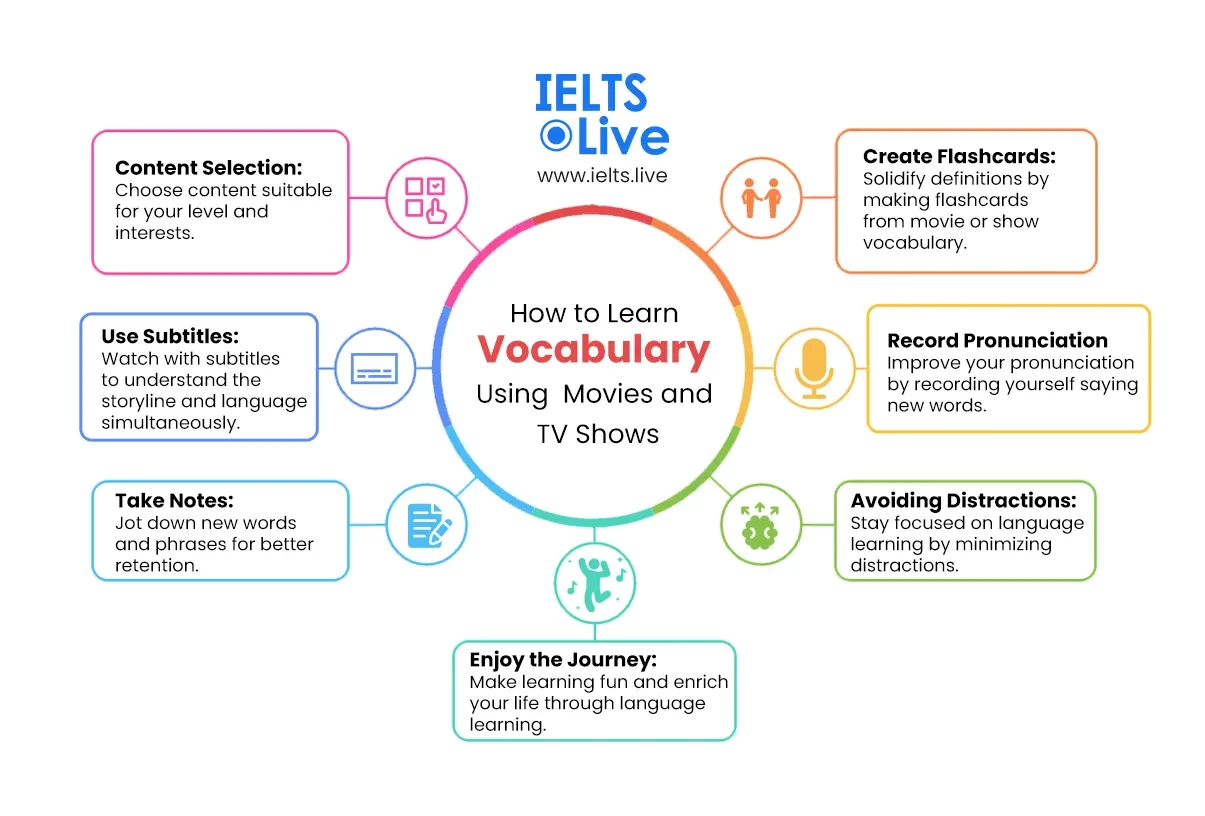
Imagine you're watching a crime drama and the detective uses the phrase "red herring" to describe a ‘misleading clue’. You may not have encountered this expression before, but by seeing it used in a realistic scenario, you can infer its meaning and remember it for future use.
Similarly, if you're watching a romantic comedy and the characters banter back and forth with witty remarks, you can pick up new phrases and idioms that will make your own English sound more natural and fluent.
Movies and TV shows can help with this because they immerse you in real language use, allowing you to learn new vocabulary in context and form connections that will make it easier for you to remember the words.
You may also like: How To Build Your Vocabulary For IELTS Exam
In this blog, we'll address common concerns like selecting the appropriate content and
avoiding distractions while offering additional advice and examples for using films and TV shows to increase your vocabulary.
By the time you're done, you'll have a new resource for your IELTS preparation toolbox as well as an enjoyable way to complement your regular studying. So, grab some popcorn, and let's begin!
let’s have a glance at some benefits of learning vocabulary from movies and TV shows:
- Exposure to a wide range of topics.
- Exposure to different accents and dialects.
Variety of media to learn from.
How to Learn Vocabulary Using Movies and TV Shows?

There are numerous ways to learn vocabulary through films and television programs. The most well-liked method is to watch with subtitles, which enables you to concentrate on the show's storyline and language at the same time. Additionally, while watching, you can jot down notes on paper or digitally using a program like Evernote or Google Keep (or even Microsoft Word).
You might want to create flashcards based on the words you hear in the film or television show you've chosen; this will help you solidify their definitions in your mind so that they'll come naturally on test day!
To make things easier for yourself later on down the road when studying for exams like IELTS, try recording yourself saying these words out loud so that you have some audio examples ready to go whenever needed during review sessions! We’ll be going into details on it later in this blog.
Why is watching movies and TV shows a great way to learn new vocabulary?
- Authentic Language Use and Context: Movies and television shows demonstrate authentic language use in context. This means you can observe how new words and phrases are used in everyday situations. If you're watching a medical drama, for example, you might hear doctors use medical jargon and technical terms that you wouldn't find in a textbook or vocabulary list. By seeing these words in context, you will be able to better understand how to use them and remember them.
- Exposure to a Variety of Accents and Dialects: Watching films and TV shows exposes you to a wide range of accents and dialects. This is especially useful if you're studying for the IELTS Listening exam, which includes speakers with a variety of accents. You can train your ear to understand different accents and improve your listening skills by watching films and TV shows.
- Entertainment Value and Motivation to Learn: Finally, watching films and TV shows can be an enjoyable way to learn new words. Watching a movie or TV show can be more engaging and motivating than traditional vocabulary exercises, which can be boring and repetitive. This can help you focus and remember the new vocabulary you've learned. For example, if you're a fan of science fiction, you might enjoy watching "Interstellar." As you watch the characters explore the universe and come across new phenomena, you may hear words like "wormhole" and "singularity" that you would not normally hear in everyday conversation. You can expand your vocabulary while watching the movie by learning these words in context.
Tips for Effectively Learning Vocabulary Through Movies and TV Shows
While watching films and TV shows can be a fun way to learn new words, it's important to use the right strategies to get the most out of your viewing time. Here are some simple tips for effectively learning vocabulary through films and television shows:
- Choosing Appropriate Content for Your Level and Interests: To maximize your learning potential, select films and TV shows that are appropriate for your age and interests. For example, if you're a beginner, you might want to start with simpler content that uses basic vocabulary. As you progress, you can test yourself with more difficult material. It's also a good idea to choose content that interests you, as you'll be more motivated to learn new vocabulary in the context of something you're interested in.
For example, if you're a beginner, you might want to start with a TV show like "Friends," which features everyday conversations between friends and uses relatively simple vocabulary. A movie like "The Social Network," which explores the world of tech startups and uses more specialized vocabulary, might appeal to more experienced viewers.
- Using Subtitles and Pausing to Analyze New Vocabulary: Using subtitles and pausing the video to analyze new vocabulary is another effective strategy for learning vocabulary through movies and TV shows. By enabling subtitles, you can see the written form of new words and phrases, which can aid in your understanding. Pausing the video to look up new words in a dictionary or analyze their meaning can also help in memory retention.
For instance, if you're watching a historical drama like "The Crown," you might come across words like "abdicate" or "regent," which have specific meanings in relation to the British monarchy. You can deepen your understanding of the language and the subject matter by pausing the video to look up these words and understand their historical context.
- Avoiding Distractions and Focusing on Language Learning: Finally, while watching films and TV shows, it is critical to avoid distractions and concentrate on language learning. This includes minimizing phone or other device interruptions and actively engaging with the content to learn new vocabulary. Setting specific language learning goals, such as identifying a certain number of new words or phrases per viewing session, is also a good idea.
For example, if you're watching a film like "The Godfather," which has complex vocabulary and dense dialogue, you should pay close attention and actively engage with the language. You can make steady progress in your language learning while watching a movie by setting a goal of identifying five new words or phrases per viewing session.
Lastly, keep in mind that learning a new language is more than just memorizing vocabulary or grammar rules. It is about meeting new people, cultures, and ideas. You can gain a deeper understanding of the world around you and open up new opportunities for personal and professional growth by expanding your vocabulary through films and TV shows.
So, put on your favorite movie or TV show in the language you're learning and enjoy it. Use the strategies we've discussed to effectively learn new vocabulary, and most importantly, have fun! By embracing language learning through films and television shows, you will not only improve your language skills but also enrich your life in a variety of ways. Good luck!






0 COMMENTS